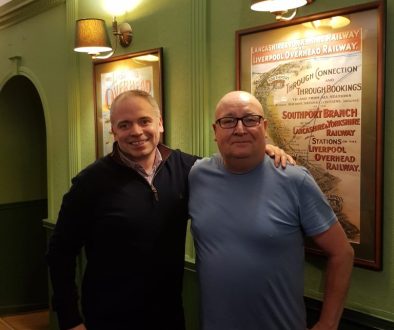Anti-racism in Social Work 2021: Patiently Waiting by Wayne Reid
This article represents my personal perspectives and not the views or sentiments of my employer or any other organisation.
‘Outlaw wisdom’
Question – What does ‘Megxit’, the KCMG medal (see above) and the Social Work professional standards all have in common?
Answer – They are all influenced by White supremacy ideology.
The treatment of Meghan Markle and her son Archie (as disclosed in her recent interview) triggered reminders for me of the sickeningly racist KCMG medal and highlights some parallels with Social Work. Of course, Britain’s long history of colonisation and slavery, very much casts a revealing spotlight on many of our ‘modern institutions’. An immediate and far-reaching example would be our colonised education curriculums. I realise ‘moral’ positions are subjective. However, it is undeniable that the subjective moral opinions (and decisions) of the powerful ‘elite’ in our democracy dictates all of our lives. “Morality cannot be legislated, but behaviour can be regulated.” (Martin Luther King).
I’d like to impart some ‘outlaw wisdom’ (as described by the White actor Matthew McConaughey), specifically on how ‘Megxit’ and the racist KCMG medal interrelates with the existing regulatory standards, poor working conditions and the disproportionately negative implications for Social Workers of colour. Meghan feels she was not afforded any protections or support from the Royal Family. Similarly, many Social Workers of colour have also expressed their dismay at the lack of protections or support during the disproportionately high number of investigations into their practice. The absence of protections and support for Social Workers of Colour further exposes them to the ‘weathering’ of pervasive racism on a daily basis. Obviously, these are just a few examples of how White supremacy works against us (people of colour).
For me, there are several correlations between the KCMG medal and the regulatory standards for Social Workers. Both are symbolic of the implicit values and ethics of the institutions they represent. Both symbolise ‘normal’ and ‘respectable’ White history. Both involve exerting authority (overt & covert – acknowledged and subliminal) over others (particularly people of colour). Both imply honourability in compliance. Both require understanding of the ethos of each institution. Both, possibly unconsciously, perpetuate ‘the lie’ (Professor Glaude) and the ‘values gap’ encoded as ‘accepted wisdom’ that “White is best.” Although Professor Glaude’s work refers to ‘the lie’ upon which America has predicated its beliefs, the relevance to the UK is unquestionable. Symbolism can generate misplaced feelings of ‘pride’ and ‘patriotism’ in those who are compliant and ‘apprehension’ and ‘isolation’ in those questioning the implicit beliefs. Citizens of “Great Britain”, with its historical adherence to White supremacist ideology, can be all too easily seduced into accepting the ‘inherent rightness’ of a position – even if that position is in desperate need of modernised review. Whether this relates to Social Work and how we respond professionally (to the least fortunate in our society), or on whom we confer honours via symbolic medals, it should all be reviewed with a sense of equal respect for ALL people. Therefore, I feel this also has relevance to the regulatory standards and other aspects of Social Work.
Maybe the morality of my perspective runs counter to the ‘norm’. However, I feel I have evidence and intelligence to support my claims. I have previously written: “Disappointingly, [neither the] education and training standards for 2019 or 2020, nor the professional standards for Social Workers, explicitly refer to anti-discriminatory (ADP), anti-oppressive (AOP) or anti-racist practice (ARP)… I refer to these facts to underline the importance of these fundamental principles… Without explicit inclusion, how else can Social Work educators and workers be properly educated and held to account on [ADP, AOP and ARP]…? The current Social Work standards are regressive and do nothing to advance the principles set out by their predecessors – despite the desperate and obvious necessity… I feel their omission in Social Work regulation is a travesty of social justice in itself.” My publicly documented concerns have not yet generated a response from Social Work England (SWE) or MP’s with the power to review and introduce new legislation or guidance.
The regulatory standards (nor their associated guidance) make no reference to the Black and Ethnic Minority workforce (or service-users of colour). I’ve commentated widely about how many Social Workers of colour feel unsupported during fitness to practice investigations. Indeed, their statistical over-representations could lead practitioners to feel the current standards overtly dominate and punish Social Workers of colour (very much like the brother in the KCMG image). I believe, at best, the standards are non-racist, but they are most definitely NOT anti-racist. Due to the omissions of ADP, AOP and ARP, I conclude that central aspects of the education, training and the professional standards in Social Work are inadequate and may currently be unfit for purpose. Perversely, the standards can be perceived as tools being used to discriminate and oppress Social Workers of colour (and consequently service-users of colour). However, I can only infer that the value of my opinions on this matter have about as much merit as the life of the unfortunate brother on the KCMG medal…
My mentality is to carry on regardless. My narrative reflects my lived experiences and those of people like me who are routinely judged, based on their skin colour. I write this article from both personal and professional perspectives. I use the terms ‘people of colour’ and ‘Black and Ethnic Minority people’ interchangeably for ease. In my observations, I reiterate, I do not speak on behalf of all Black and Ethnic Minority people or Social Workers – as we are not a homogenous group. I also do not want to be heard as the tokenistic ‘Black voice’ of my employer (BASW). My writing here may not represent the views of the Association. I’m one of many Black voices in the profession. I realise that I’ve been ‘let in’ (to some extent) to express my views because (to quote the Black historian David Olusoga), I “won’t scare the horses.”
For the record, I’m not aspiring to be a ‘nice guy’ when it comes to combating inherently racist regimes and systems. ‘Niceness’ is often weaponised against people of colour. My motivation is for the cause, not applause – and the cause is Black Lives Matter. This is a hearts and minds campaign. I’ve previously commentated on how the legacies of slavery are not just outdated ideas; but are actually woven into the very fabric of modern society. The prelude to my current thinking is outlined in my previous articles here: 1, 2, 3 & 4. My narrative is a combination of fact, evidenced-based opinions, and solution-focused methods. Consider this a comprehensive (and forensic) report from the forefront of ‘Anti-racism in Social Work’.
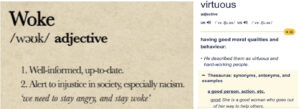
The Wake-up Show
There is a big difference between being anti-racist and not wanting to be seen as ‘a’ racist. Equally, there is a category of people, who are more scared of being labelled as racist, than they are of actually being racist.
An individual (or organisation) that is anti-racist is much more likely to recognise why they themselves are potentially racist; understand how they have been socialised to be inherently racist and identify the benefits they receive from the existing racist structures. Those embracing macho ‘anti-woke’ and ‘politically incorrect’ descriptors as laudable (even a ‘badge of honour’), seem unable (or unwilling) to view introspection, self-reflection or self-awareness as supreme personal qualities. ‘White psychosis’ (as described by Kehinde Andrews) is expressed in strange ways.
It’s a damning indictment on society, when to be described as ‘woke‘, or to be a ‘do-gooder’ or in any way ‘virtuous’ is considered derisory. This defies my sense of logic and is ‘selective outrage’ to me. Personally, I think it’s an important quality to want to “do good” for my fellow human beings and strengthen our societal interdependence.
Perhaps you might want to challenge the next self-proclaimed ‘anti-woke’ advocate to actually define the word ‘woke’ during one of their blinkered monologues? I suspect their logic will be laced with absurdities. Some will cite the Commonwealth as a victory on race relations. ‘Common’ ‘wealth’ for who? Ah yes, possibly a Freudian slip in retrospect… “Ignorance, allied with power, is the most ferocious enemy [social] justice can have.” (James Baldwin)
My mantra is “pure, proactive and unapologetic anti-racism”, which underlines my militant spirit when it comes to ‘Anti-racism in Social Work’. My mentality is influenced by the hostile environment inside and outside of Social Work. I hope any readers resist the urge to ‘tone police’ my opinions. My observations reflect my environment – the ‘hostile environment’.
If you are a White person reading this article, and my article seems brutal in places, then please consider whether YOU might be part of the problem and whether YOU should DO THE WORK to become a better person and ally! Normalise changing your opinion when presented with new validinformation – it is healthy. So, if you describe yourself as ‘anti-woke’ or ‘anti-BLM’ and have no interest in changing that view, then for your own wellbeing, I suggest you stop reading now – as this article will be uncomfortable reading. “There is no form of protest that is acceptable to racists” (Bernice King).
The profusion of complaints to the National Trust and Sainsbury’s about their attempts to promote racial equality indicates to me that the ‘anti-woke’ are content with the status quo. Seemingly, they applaud the rise of White supremacy, as opposed to wanting to engage in progressive debates on racial equality and other forms of discrimination.
In my work, I’m able to act as an Anti-racism Visionary for Social Work across England. I utilise different strategic approaches including: shock and awe; edutainment; collaboration and allyship. My knowledge and expertise relates to anti-Black racism and developing support and protections for Social Workers of colour (and our allies). I hope to continue working effectively with organisations, leaders and relevant stakeholders nationally to properly integrate the essence of anti-racism into Social Work at every level. I genuinely want to engage and collaborate with authentic allies and professionals who want to improve the circumstances of Social Workers and service-users of colour. Preferably, with people who are honest about where they (and their organisations) are at on their anti-racism journey.
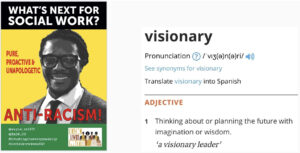
Patiently waiting
I am saddened by the inaction and silence (so far) from Social Work England (our national regulatory body) on anti-racism. Since May 2020, I’ve reported widely on the significant deficits I observe within the profession and the wording of the regulatory standards. I have highlighted the lack of protections and support for Social Workers of colour; cited their over-representation in fitness to practice panels and commentated on their disproportionately negative outcomes on Assessed and Supported Year in Employment programmes. The coverage and prominence of anti-racism in Social Work in recent months has been inescapable (since George Floyd’s murder). The silence from the regulatory body of the profession (and MP’s) continues to perplex and concern me. Furthermore, confidence is not instilled when the majority of the regulator’s workforce is predominantly White with no transparency about how this is being addressed or reversed. This could be mistaken for ‘pigmentocracy vs meritocracy’.
In collaboration with colleagues and allies (inside and outside of BASW England), I’ve amplified the voices of Black and Ethnic Minority Social Workers in OUTLANDERS. I’ve published an anti-racist Social Work framework and outlined readily deployable strategies. I’ve developed a comprehensive ‘Anti-racism in Social Work’ presentation and delivered it at nearly 100 online events internationally (since May 2020). I founded the BASW England Black & Ethnic Minority Professionals Symposium (BPS) (which is a multi-talented network of professionals across England). I was joint winner of ‘Author of the Month’ in December 2020 for Social Work News magazine. I’ve created a repository of anti-racism resources, which is utilised by thousands of Social Workers, organisations and stakeholders across the UK. Here is my ‘Anti-racism in Social Work’ portfolio. Despite my prolific work on ‘Anti-racism in Social Work’, I’m disheartened I have not been approached by the Social Work England (SWE) hierarchy or responsible Ministers to explore how my solutions to promote anti-racism within the profession might be attempted. I fear losing any momentum we have.
I remain patiently waiting for any opportunity to progress this work meaningfully. Admittedly, I am crestfallen, because I do not want to interpret the lack of responsivity as denial and rejection of my knowledge, expertise and lived (personal and professional) experiences. I hope the lack of communication is not pejorative.
In my work role (in BASW England), I have proactively spearheaded the resurgence of anti-racism in Social Work. Alongside the wide-ranging accomplishments of BASW colleagues and BASW members, numerous other activists and groups have also made strides in accelerating the ‘Anti-racism in Social Work’ movement in recent months. These activists include: Anti-racist Activism (@SWAction21); Shabnam Ahmed (@schoolofshabs); Social Work Action Group (@SWactionuk); Claudia Crawley (@ClaudiaWPC); Black Social Matters (@Black_SocM); The Anti-racist Library (@AntiRacistLibr) and many others. Anti-racism Lead Practitioners are now employed at Brighton & Hove and Sutton councils – which are fantastic appointments. It’s positive to see new precedents being set in this regard. I hope we can continue to be bold in pushing the anti-racism agenda forward in Social Work policy, practice and education.
The above fellow activists, allies and colleagues are at various stages of their Social Work careers and are based in wide-ranging settings; working towards a common goal – embedding ‘Anti-racism in Social Work’ and upholding social justice. However, many of our endeavours are embryonic and need nurturing. Support from Social Work leaders will be vital going forward. The ‘Anti-racism in Social Work’ movement requires ALL Social Workers of colour and their allies to galvanise, strategise and mobilise bravely. Collective action is resistance. “Find your brave.” Anyone who attended the OUTLANDERS virtual launch event knows exactly what I’m talking about.
I do not wish to appear populist or journalistic in my observations, but I genuinely do not know whether some of the senior personnel at SWE are aware of my work or are just ignoring it. I would prefer transparency and to be told that my efforts are not in accordance with their perceived vision – if that is the case. I recognise there are minefields and pitfalls in embedding anti-racism in Social Work. However, my door has remained metaphorically wide open for months. I hope to work collaboratively and effectively with those in charge of policy shifts wherever possible.
Those who finance, regulate, inspect and dictate the profession’s policies must do more than just be seen to acknowledge the advent of another social justice celebration. Black History Month, Holocaust Memorial Day, LGBTQ+ History Month, International Women’s Day etc are often all met with bland blogs or unexciting position statements with woolly platitudes (if it all). However, there is rarely accountability, substance or, more importantly – action. What is beneath the veneer? This tokenism is not just confined to anti-racism. My intelligence feels insulted when I read comments like: “…our statement of intent and inclusion shows how [anti-racism] is part of our core business.” How can that be, when no actual proof is presented or when ‘anti-racism’ is only mentioned (fleetingly) once in the entire document? Personally, I will take the stockroom over the showroom any day. This can easily be mistaken for brazen performative allyship.
So, to reiterate and summarise, what really is the level of commitment, motivation and intention from SWE on anti-racism? I think any plans to address these matters ‘privately’ (like the Royal Family’s response to ‘Megxit’) will not set the right example for the profession. I fear this would be a volley into the ‘long grass’. Also, just so we are clear, suppressing racism does not mean racism does not exist.
Sadly, to my knowledge, none of the ‘Anti-racism in Social Work’ activities that I’ve been involved in have generated endorsement or support from SWE. I sent an open invitation to SWE to view an online presentation I was delivering at the Anglia Ruskin University on 25/03/21. Unfortunately, I did not receive a reply. I shared a draft version of this article (with my portfolio and presentation) with SWE to offer them the right to reply and/or shape the final version. I received the following reply: “[We do not wish to make any comment at this point.] We will continue our dialogue with the sector more broadly, as well as various representative groups within it, on all matters relating to equality, diversity, and inclusion (including anti-racism) as we continue to develop our work and approach. The strategic conversations we are involved with at a national level will also drive conversation and change. Good luck with the article and your portfolio.”
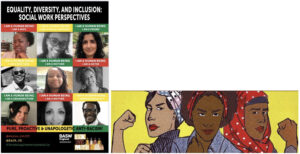
Scything through the ‘long grass’
A Community Care article (from July 2020) cited the lack of ethnic diversity within the SWE workforce. In a previous article, I queried whether this was being treated as a top priority. I’ve had no response and (to my knowledge) there has been no news on this front. For me, it’s also a concern that our regulator does not appear to have 1 designated Equality Diversity and Inclusion (EDI) Lead Officer. I’m pleasantly surprised to read the Royal Family plan to recruit a ‘diversity tsar’. My hope is this will be replicated swiftly in Social Work regulation.
Other Community Care articles (from February 2021 and March 2021), have reported on the “delays in fitness to practise processes having ‘life-changing impacts’” for the workers concerned. Social Workers of colour are over-represented in these cases. Therefore, it’s probably safe to assume they are the same unfortunate individuals being disproportionately affected by this. Again, I’m unaware of any action being taken to remedy this. We need transparency. We must scythe through the ‘long grass’ to make any real progress.
I’m keen to ascertain the details about if/when/how these issues will be resolved. I think it will be important that staff members responsible for EDI at SWE are well versed in the multi-layered complexities involved in fitness to practice investigations. I’m pleased to see our regulator has developed a Professional Experts Panel and is appointing members with a solid background in social justice and workforce development. However, I was unable to find any information about the panel members (including their backgrounds and careers in England, UK and overseas) on their website. Again, I feel it is important that the panel can reflect with insight, the diverse range of backgrounds and experiences of those within the workforce. Also, transparency about the panel’s membership would be welcome. Obviously, I am keen to develop ’Anti-racism in Social Work’ in policy, practice and education. My hope is that there will be scope for improved partnership working with BASW and myself on related matters. I genuinely welcome any contact or indication of future plans I receive from our regulator.
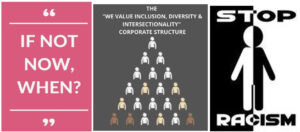
Social work remains institutionally racist
Sir William Macpherson (RIP) coined the term ‘institutional racism’ in his report into the racially motivated murder of Stephen Lawrence. Macpherson’s investigative report concentrated on the role of Metropolitan Police. The report was ordered by the Home Secretary on 31/07/97. In 2019, Ibram X Kendi published his book ‘How to be an Anti-Racist’. Therein, he states he would relegate the term ‘institutional racism’, and instead, refer to ‘racist policies’. I can understand and appreciate both positions and their contemporary relevance. One of my previous articles evidencedsome indicators of institutional racism in Social Work. It received widespread agreement (and acclaim) from my peers. However, sadly, it failed to generate any response from SWE, the institution responsible for policy changes in Social Work.
When I share my ‘Anti-racism in Social Work’ activities on Twitter, LinkedIn etc, I can only imagine the responses from those who do not contact me, who overlook my presence and ignore my polite requests. Whatever one thinks about the use of such media platforms, they are an accepted method of modern communication. From teens in their bedrooms, to the Whitehouse – it is the ‘new normal’! ‘Sound bites’, cliches and sassy one-line statements abound, I acknowledge they can be ‘reductivist’ and oversimplify issues sometimes. However, notwithstanding those observations, I want to believe that SWE’s silence is not complicity with aspects of existing inequalities or oppression.
My concerns are that until visible progress is made, Social Workers may construe this silence as ‘wilful blindness’. In a world of ‘influencers’ and demi-god statuses set by ‘celebrities’ and TV personalities, dangerous opportunities exist to corrupt the truth. I think the recent Piers Morgan’s demonstration of ‘White fragility personified’ (and Susannah Reid’s silent collusion) is one such corrupting and divisive episode. It will be interesting to see if Mr Morgan resurfaces in a better situation for his career very soon. This very public debacle basically weaponised and perpetuated the potentially damaging effects of lazy racism. However, Mr Morgan’s career does not seem to have been harmed by such actions previously. Time will reveal if my scepticism is unjustified.
I realise this article highlights connections between elements of society which for some people might not be easy to view as related. I know some will passionately disagree. I welcome constructive and intelligible debate. I suspect that some people without colour, will lose interest and patience with ‘Anti-racism in Social Work’ eventually. I realise that for some people without colour, the intricacies of language and terminology (BAME etc); ascertaining covert racism; demonstrating authentic allyship etc can all be extremely challenging and tiresome. However, there are some simple dichotomies we can easily extract. Anti-racism is about: Black liberation vs Black subjugation; allyship vs White supremacy; human rights vs inhumane violations. The more ‘subjective opposites’ might be ‘right vs wrong’ and ‘good vs evil’. What side are you on? As with all subjective opinions, varied perspectives will arise and I’m open-minded enough to consider them. Anti-racist values, ethics and objectivity within organisational policies can be achieved.
On a more positive note, I’m pleased the Chief Social Workers for Adults and Children & Families have acknowledged their previous shortcomings on these matters and re-emphasised the importance of anti-racism. Hopefully, this will involve the Workforce Race Equality Standards (WRES) being made mandatory and universal across the profession with a sense of urgency and supplemented by other national initiatives from key Social Work stakeholders and policy makers.
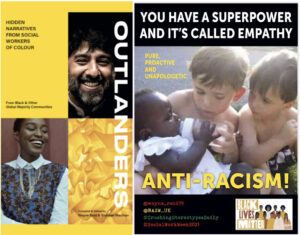
The OUTLANDERS anthology
OUTLANDERS: Hidden narratives from Social Workers of Colour, is an anthology of essays, stories, poems and other miscellaneous works – which I co-edited and compiled in collaboration with Siobhan Maclean. I’m proud to have been involved with OUTLANDERS and the richness and uniqueness it exudes. People have enquired whether I will profit from the book. Definitely not! The profits will go to the Social Workers Benevolent Trust (SWBT). At the time of writing, the book has sold 1000 copies and raised £700 for the SWBT. As far as I’m concerned, OUTLANDERS is a legacy piece of Social Work history and literature. Siobhan and I’s ‘labours of love’ for OUTLANDERS is an eternal gift to the Social Work profession.
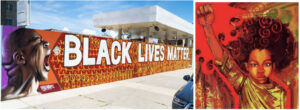
The anniversary of George Floyd’s murder
As the anniversary of George Floyd’s murder fast approaches (25/05/21), I want to gather intelligence and map the anti-racism activism that has taken place across Social Work. I want to publish my findings and showcase the strides being made in the profession and spotlight where the ‘anti-racism deficits’ exist across the Social Work landscape nationally. So, please email me with any ‘evidence’ you have, such as: articles, flyers, group activities, posters, virtual events, statements, updated guidance/policies/procedures etc to protect and support Social Workers of colour. Just basically send me anything and everything your Social Work organisation has undertaken on anti-racism over the past several months! Please contact me at wayne.reid@basw.co.uk or @wayne_reid79 (Twitter) to enable me to give your accomplishments a platform. I’ll do whatever I can to promote organisations that are really serious about ‘Anti-racism in Social Work’. The closing date for submissions is 14/05/21 at 5pm.
The iridescent flag of anti-racism
Consider this, has any Black human rights activist ever been welcomed by ‘the establishment’? No. The obstacles we face are simply just the latest manifestations of what people like me have battled continuously against throughout the ages. My adversaries will probably try to assassinate me (or my character) at some point. However, whilst there is air in my lungs, I will continue to educate, equip and empower Black and Ethnic Minority Social Workers and our allies. Also, I will continue to mercilessly spotlight, shame and subvert opponents of ‘Anti-racism in Social Work’. I suppose I’m like the proverbial ‘thorn of anti-racism’ in their backsides. It’s the perfect antidote for ‘anti-wokism’. Let the goodness flow!
You can call me an ‘extremist’ if you want. I admit, I’m extremely anti-racist. Ultimately, my destiny is to see the iridescent flag of anti-racism flying high on the Palace of Silence – or die trying.
Let’s not forget, “when you’re accustomed to privilege, equality feels like oppression”. The only real enemy of progress is ignorance and ‘wilful blindness’.
Social justice must prevail.
‘One world, one race… the human race!’
As always, thanks for reading.
